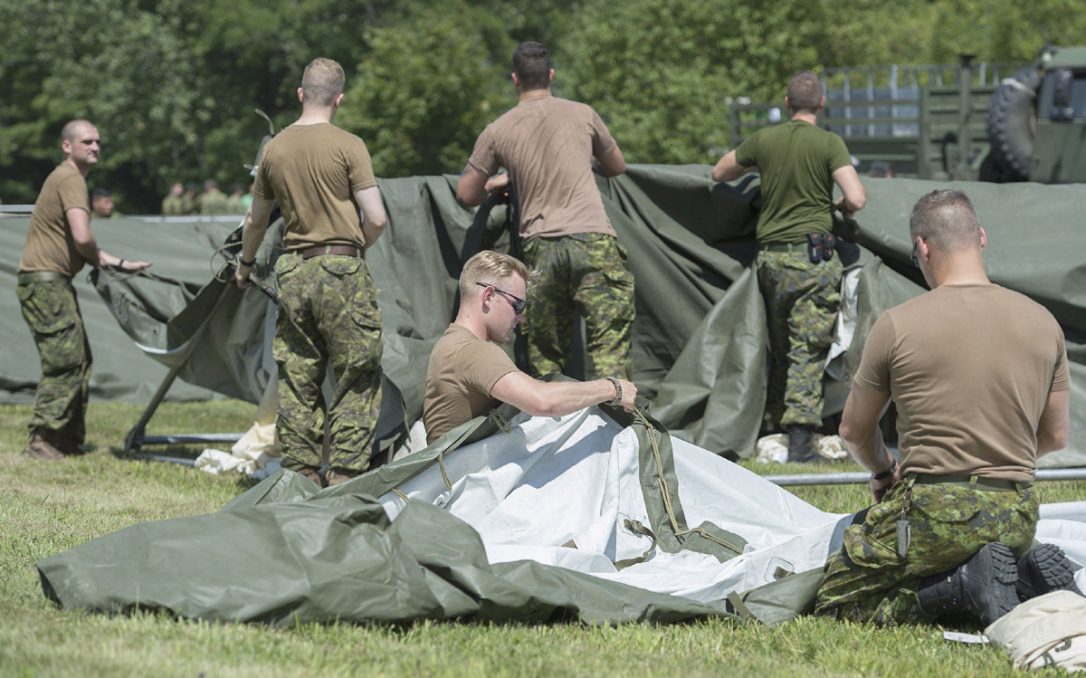
Canadian Forces erecting tents for 500 new arrivals near the Canada-U.S. border in Quebec. [AP]
The Department of National Defence says the camp in Saint-Bernard-de-Lacolle, Que., can house up to 500 people. The “modular tent shelters” have floors, lighting and heat.
“Setting up tents—this is something, obviously, we’re quite familiar with. We’re pretty good at doing this,” Major Yves Desbiens told the CBC.
Before anyone complains that this shouldn’t be the job of our fighting forces—remember, these are the same forces who were summoned to Toronto to shovel snow in 1999.
After Stephen Harper’s Conservative Party tried to make Muslim immigration an election issue in 2015, Justin Trudeau promised to accept 25,000 Syrian refugees by year’s end. He won the election and, although the government didn’t make the year-end deadline, the official number of Syrians brought to Canada mounted—to 40,081 by Jan. 29, 2017.
The military stood up then too, assigning units to prepare the way and vacating beds at bases to accommodate displaced families. Military planes ferried security and immigration officials to Jordan, Lebanon and Syria and airlifted refugees out of the region, reminiscent of 1979 when Canadian military aircraft rescued Vietnamese escaping the communist regime in Hanoi.
Last week, Immigration Canada said the number of asylum seekers illegally entering Canada near the Saint-Bernard-de-Lacolle border crossing quadrupled in two weeks, from 50 to 200 a day.
Many are Haitians who have been living in the U.S. for years but now face deportation after the May announcement that the government would not extend temporary protection status for Haitian nationals past the scheduled expiry in January 2018. The status had been granted following a devastating earthquake in 2010, but the U.S. Department of Homeland Security now considers Haiti a safe country.
There is no guarantee the Haitians will be able to remain in Canada either. Claimants must demonstrate a legitimate fear of persecution, war or other threat in their country of origin.
It’s not the first time one of America’s immigration policy decisions has affected Canada since President Donald Trump was sworn in last January. Repeated attempts to ban immigration from seven Muslim-majority countries and a subsequent spate of deportations of citizens of those countries spawned a flood of illegal crossings at remote border areas through the winter and spring of 2017 as asylum seekers turned to Canada for help.
Some suffered frostbite as they crossed snowy fields heading north, while at least one—Ghanian Mavis Otuteye, 57—was found dead of hypothermia less than one kilometre from the Minnesota-Manitoba border in May.
RCMP officers and other Canadians were there to meet those who made it. They took them in, fed them, clothed them and began the process of addressing their long-term needs. Because that is what Canadians do.
But Canadians, and the Canadian military, can only do so much. As much as we are willing to help, Canada should not be the dumping ground for America’s unwanted.
After Trump announced his initial attempt at banning immigration from certain Muslim-majority countries in January, Trudeau tweeted: “To those fleeing persecution, terror & war, Canadians will welcome you, regardless of your faith. Diversity is our strength.”
It’s an admirable sentiment, but isn’t it also time Ottawa got tough with the tough-talking Trump?
Click here to view more photos at the refugee camp by Daily Mail’s Normand Blouin.
Advertisement




















